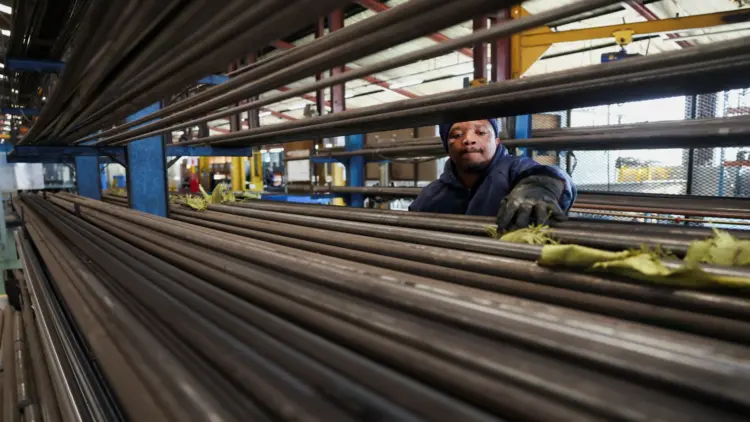South Africa’s steel industry faces an existential crisis as Chinese imports flood domestic markets, forcing the government to consider unprecedented tariff increases that could reshape the country’s industrial landscape. The proposed duties represent a desperate attempt to save thousands of jobs and preserve critical manufacturing capacity in the face of overwhelming foreign competition.
Proposed tariff increases aim to shield domestic producers
This trade protection battle highlights the broader global struggle between free market principles and industrial survival in developing economies. The outcome will determine whether South Africa can maintain its steel production capabilities or surrender to the relentless tide of cheap imports.
South Africa’s International Trade Administration Commission on Wednesday proposed import duties starting at 10% on steel products as part of measures to defend the sector from an influx of imports.
The government body released its preliminary findings after a broad review of steel tariffs it announced in March, as part of a response to South Africa’s steel crisis, marked by oversupply, weak local demand, and high input costs.
Imports, mainly from China, are estimated to meet around 35% of total domestic consumption, leaving companies such as ArcelorMittal South Africa ACLJ.J, the country’s biggest primary steel producer, at risk of collapse.
The sector’s pain has increased as U.S. President Donald Trump’s tariffs have added to South Africa’s challenges.
Arcelormittal South Africa faces imminent collapse without government intervention
The commission, whose role includes conducting tariff investigations, offering trade remedies, and implementing import and export controls, said its initial findings would not become final until it has received and reviewed feedback from the public over the next two weeks.
It said in a notice it had received more than 150 submissions “ranging from requests for duty increases, the creation of rebate provisions, inclusion of specific products under import control”.
Industry stakeholders demand emergency measures
It has proposed customs duty increases of 10% on products including flat-rolled steel, bars and rods, as well as wires whose applied rate is currently 0%. Selected tube and pipe products, as well as nails, would attract 15% duty, up from 10%, according to the schedule.
There is also provision for rebates on some steel products that have to be imported because they are not available in South Africa or in the Southern Africa Customs Union, which also includes Botswana, Eswatini, Lesotho, and Namibia.
The overwhelming response from industry stakeholders, with over 150 submissions received, underscores the widespread concern about the steel sector’s future and the urgent need for government intervention to prevent further industrial decline. The proposed rebate system acknowledges the complex reality of regional trade relationships while attempting to balance protection for domestic producers with the practical needs of downstream industries.
Regional customs union arrangements complicate South Africa’s tariff protection strategy
The delicate balance between protecting domestic steel production and maintaining regional trade relationships within the Southern Africa Customs Union presents complex policy challenges that require nuanced solutions. The proposed rebate mechanisms demonstrate South Africa’s attempt to shield local producers while preserving access to specialized steel products not manufactured domestically, ensuring that downstream industries dependent on these materials can continue operating without disruption.
South Africa’s steel crisis has been exacerbated by the ripple effects of Trump’s global trade policies, which have disrupted traditional export markets and redirected Chinese steel exports toward alternative destinations, including African markets.
The convergence of domestic oversupply, weak local demand, and increased import pressure from diverted Chinese production creates a perfect storm that threatens the viability of the entire South African steel sector. Government intervention through tariff protection represents the last line of defense for an industry that employs thousands of workers and supports numerous downstream manufacturing activities critical to the country’s industrial base.
GCN.com/Reuters


